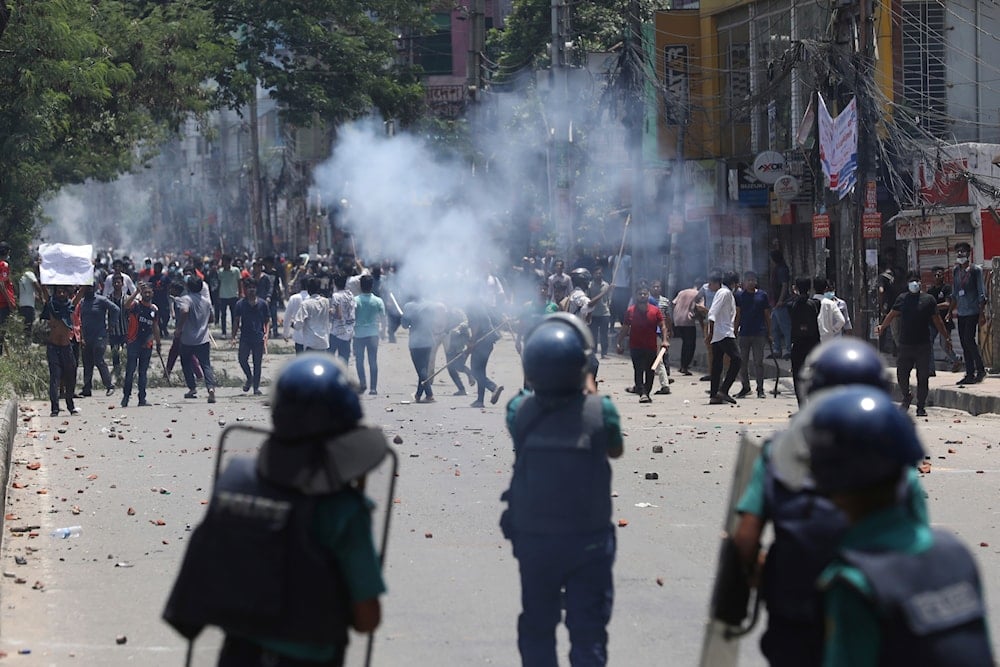Bangladesh police given ‘shoot-on-sight’ orders despite 133 death toll
A positive decision is unlikely to calm the nation's simmering rage in the wake of the intensifying crackdown and growing death toll.
-

Students clash with riot police during a protest against a quota system for government jobs, in Dhaka, Bangladesh, Thursday, July 18, 2024. (AP)
In Bangladesh, 133 people were killed in widespread riots between police and university students over civil service hiring rules, which were to be decided by Bangladesh's top court on Sunday.
This week's turmoil has been among the worst under Prime Minister Sheikh Hasina's tenure as it started as a protest against politicized admission quotas for highly desired official jobs.
Now, police have been issued "shoot-on-sight" orders and a nationwide curfew has been enforced.
An internet blackout that has affected the whole country since Thursday has severely limited the flow of information to the outside world, and soldiers are now patrolling cities around Bangladesh after riot police were unable to stabilize the situation.
The Supreme Court was expected to meet on Sunday to issue a verdict on whether to end the contentious job quotas.
Hasina made hints to the public this week that the plan will be abandoned, which comes after her opponents accused her government of using the judiciary to further its own agenda.
However, a positive decision is unlikely to calm the nation's simmering rage in the wake of the intensifying crackdown and growing death toll.
Business owner Hasibul Sheikh, 24, relayed to AFP at one of Saturday's street protests in Dhaka, "It's not about the rights of the students anymore," adding, "Our demand is one point now, and that's the resignation of the government."
Bangladeshi state TV headquarters SET ablaze, leaving 'many' trapped inside: station
— Piyush Gupta (@PiyushNeekhra) July 18, 2024
Protesters set fire to the headquarters of Bangladesh's primary state broadcaster, BTV, trapping "many people" inside, according to posts on the network's verified Facebook page. pic.twitter.com/1SyjDQ1weR
Angered by high youth unemployment, with approximately 32 million people unable to find work or receive an education, students organized demonstrations demanding the abolition of the 56% job quota that allocates 30% for families of veterans who served in the 1971 independence war against Pakistan.
Demonstrators have stated that the job quota ultimately favors supporters of Prime Minister Hasina's party, excluding new job seekers from the labor force. As a result, they are also demanding the replacement of the current political system with a merit-based one.
Government jobs are highly coveted in Bangladesh and are now more pivotal as the country’s economy struggles to recover from the pandemic and years of strong growth. Essentially, the anti-quota protests were sparked last month but escalated to violence earlier this week, alongside Bangladesh’s main opposition party joining the demonstrations.
Read more: 32 dead in Bangladesh anti-quota protests, state TV HQ set ablaze
Crisis Group's Asia director Pierre Prakash told AFP, "Rather than try to address the protesters' grievances, the government's actions have made the situation worse."
Prime Minister Hasina has served for four consecutive terms following her re-election in January. Ultimately, the protests created various issues for the diplomat, whose government is seeking funds from creditors and the International Monetary Fund (IMF) to improve the nation’s foreign exchange reserves.
The politician asked student protesters in a televised speech on Wednesday to have trust in the legal system where the quota system is being debated while pledging to prosecute the “criminals” responsible for the invocation of violence. In addition, she highlighted that a judicial committee will be assembled to probe the "anarchy".
Due to the nationwide shutdown, the government posted parliamentary troops and the police together across the country in an attempt to tighten security.
The US State Department warned Americans on Saturday not to travel to Bangladesh and said it would begin removing some diplomats and their families from the country due to the civil unrest.

 4 Min Read
4 Min Read










